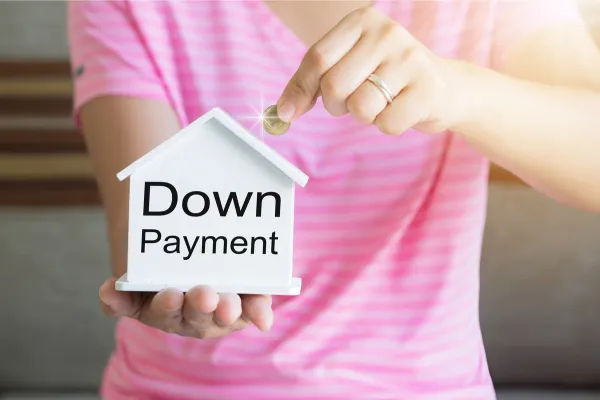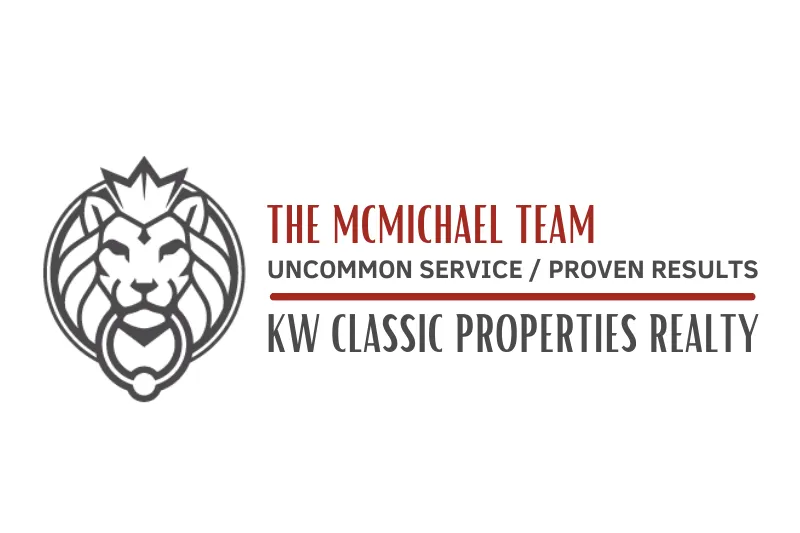Recent Posts

What You Need to Know About Down Payments When Buying a Home
“You’re actually investing in your future, not buying a home!” - Sarah F. Findel
Introduction:
Embarking on the journey of homeownership involves many financial considerations. One of the decisions you'll encounter is determining your down payment. While it may appear straightforward at first glance, there is more to it than just a lump sum of money. There are important details to grasp in order to make well informed choices on your path towards owning a home.

Making a larger down payment can have several advantages, including lower monthly mortgage payments, reduced interest costs, and increased chances of mortgage approval.
What Is a Down Payment?
A down payment refers to an upfront payment made, at closing, when buying a home. It typically represents a percentage of the property's purchase price and serves as your initial investment in the house. The remaining cost of the home is covered by your mortgage loan. In addition to your down payment money, you will need to have funds for closing costs. Don't confuse down payment with closing costs. They are separate expenses in the homebuying process. Closing costs are the funds needed to pay your lender and the title company to close the loan.
How Much Should You Put Down?
The appropriate amount for your down payment can vary significantly from case to case. While 20% is often considered standard practice, many prospective homeowners opt for lesser amounts. Some programs, like VA loans, allow as little as zero down. FHA loans will allow 3.5% down payment. Next we will discuss choices for your down payment, considering the advantages and disadvantages of each option.
Advantages of a Larger Down Payment
Opting for a larger down payment can bring several benefits, such as, lower monthly mortgage payments, reduced interest expenses, and increased likelihood of mortgage approval. If you can afford to make a larger down payment, it is good to do so in most cases.
Programs Offering Down Payment Assistance
For those who require assistance, there are both government and private programs that provide support with down payments. Your lender can provide information on these programs and guide you on how to assess your eligibility.
Factors Impacting Your Required Down Payment
Many factors can influence the amount of down payment you need including your credit score, the type of mortgage you select, and the property's purchase price. Let's break down how each of these factors influences the amount you'll need to put down:
1. Home Price: The most apparent factor is the price of the home you intend to buy. Down payments are typically expressed as a percentage of the home's purchase price. The higher the price of the home, the larger your down payment will need to be.
2. Lender Requirements: Different lenders may have varying requirements when it comes to down payments. While 20% is often considered the standard, some lenders may accept less, especially for first-time homebuyers or those with excellent credit. Conversely, others may require more substantial down payments, depending on your financial situation and the type of mortgage you're applying for.
3. Mortgage Type: The type of mortgage you choose can significantly impact your down payment. Government-backed loans, such as FHA loans, often allow for lower down payments, sometimes as low as 3.5%. Veterans may qualify for VA loans with no down payment requirements. Historically Conventional loans required 20% or more down payment but now there are Conventional loans with as little as 3.5% down payment.
4. Credit Score: Your credit score plays a vital role in determining not only whether you'll be approved for a mortgage but also the down payment amount. A higher credit score can make you eligible for loans with lower down payment requirements. Conversely, a lower credit score might necessitate a larger down payment to secure financing.
5. Debt-to-Income Ratio (DTI): Lenders consider your debt-to-income ratio when evaluating your mortgage application. A lower DTI, which indicates you have fewer outstanding debts relative to your income, can make you eligible for loans with more favorable down payment terms. Conversely, a high DTI may require a larger down payment to mitigate risk for the lender.
6. Location and Loan Limits: The geographical area in which you're purchasing a home can impact your down payment requirements. In some regions, there are loan limits imposed by the government. If you're buying a home in an area with higher loan limits, you may be able to put down a smaller percentage of the home's price.
7. Financial Goals and Flexibility: Your own financial goals and flexibility also play a role. You might choose to make a larger down payment to lower your monthly mortgage payments or to avoid private mortgage insurance (PMI). Alternatively, if you prefer to keep more cash on hand for other investments or financial goals, you might opt for a smaller down payment, even if it means higher monthly payments.
Understanding these variables and working with a knowledgeable mortgage professional can help you determine the right down payment strategy for your specific situation.
Saving for Your Down Payment
Saving money towards a down payment is a crutial step in the homebuying process. Here are some tips on how to save money for a down payment on a house:
1.Create a budget and track your expenses to identify areas where you can cut back and save more money.
2.Set up a separate savings account specifically for your down payment and contribute to it regularly.
3.Consider cutting back on non-essential expenses such as dining out, subscription services, and entertainment.
4.Look for ways to increase your income, such as taking on a part-time job or freelancing.
5.Explore down payment assistance programs or grants that may be available in your area.
Acquiring Down Payment Funds
Apart from savings there are other sources from which you can obtain funds for your down payment, such as receiving gifts from family members, down payment assistance programs, seller contributions, or taking advantage of employer assistance programs. Navigating the complexities of down payments and mortgages can be challenging. Consulting with a mortgage professional can provide personalized guidance. They can analyze your financial situation, credit history, and goals to help you make an informed decision about the down payment amount that suits your needs.
Conclusion
In conclusion, your down payment amount is influenced by a combination of factors, including the property's price, lender requirements, mortgage type, credit score, location, and your unique financial circumstances and goals. It's crucial to evaluate these variables carefully and seek expert advice to make a well-informed decision about the down payment that aligns with your homeownership objectives. Remember, a well-planned down payment strategy can pave the way for a successful and financially secure homeownership journey.
FAQs
1. Can I buy a home with no down payment?
While it's possible through certain loan programs, most conventional mortgages require a down payment.
2. What are closing costs, and are they the same as a down payment?
Closing costs are separate from the down payment and include fees associated with the home buying process, such as appraisal and title fees.
3. Are there tax benefits associated with down payments?
In some cases, mortgage interest payments may be tax-deductible, which can provide a financial benefit over time.
4. Can I use a gift from a family member for my down payment?
Yes, many lenders accept down payment funds in the form of a gift, but specific rules and documentation are typically required.
5. What's the minimum down payment required for an FHA loan?
The minimum down payment for an FHA loan can be as low as 3.5% of the purchase price, making it a popular choice for first-time homebuyers.
Recent Posts

What You Need to Know About Down Payments When Buying a Home
“You’re actually investing in your future, not buying a home!” - Sarah F. Findel
Introduction:
Embarking on the journey of homeownership involves many financial considerations. One of the decisions you'll encounter is determining your down payment. While it may appear straightforward at first glance, there is more to it than just a lump sum of money. There are important details to grasp in order to make well informed choices on your path towards owning a home.

Making a larger down payment can have several advantages, including lower monthly mortgage payments, reduced interest costs, and increased chances of mortgage approval.
What Is a Down Payment?
A down payment refers to an upfront payment made, at closing, when buying a home. It typically represents a percentage of the property's purchase price and serves as your initial investment in the house. The remaining cost of the home is covered by your mortgage loan. In addition to your down payment money, you will need to have funds for closing costs. Don't confuse down payment with closing costs. They are separate expenses in the homebuying process. Closing costs are the funds needed to pay your lender and the title company to close the loan.
How Much Should You Put Down?
The appropriate amount for your down payment can vary significantly from case to case. While 20% is often considered standard practice, many prospective homeowners opt for lesser amounts. Some programs, like VA loans, allow as little as zero down. FHA loans will allow 3.5% down payment. Next we will discuss choices for your down payment, considering the advantages and disadvantages of each option.
Advantages of a Larger Down Payment
Opting for a larger down payment can bring several benefits, such as, lower monthly mortgage payments, reduced interest expenses, and increased likelihood of mortgage approval. If you can afford to make a larger down payment, it is good to do so in most cases.
Programs Offering Down Payment Assistance
For those who require assistance, there are both government and private programs that provide support with down payments. Your lender can provide information on these programs and guide you on how to assess your eligibility.
Factors Impacting Your Required Down Payment
Many factors can influence the amount of down payment you need including your credit score, the type of mortgage you select, and the property's purchase price. Let's break down how each of these factors influences the amount you'll need to put down:
1. Home Price: The most apparent factor is the price of the home you intend to buy. Down payments are typically expressed as a percentage of the home's purchase price. The higher the price of the home, the larger your down payment will need to be.
2. Lender Requirements: Different lenders may have varying requirements when it comes to down payments. While 20% is often considered the standard, some lenders may accept less, especially for first-time homebuyers or those with excellent credit. Conversely, others may require more substantial down payments, depending on your financial situation and the type of mortgage you're applying for.
3. Mortgage Type: The type of mortgage you choose can significantly impact your down payment. Government-backed loans, such as FHA loans, often allow for lower down payments, sometimes as low as 3.5%. Veterans may qualify for VA loans with no down payment requirements. Historically Conventional loans required 20% or more down payment but now there are Conventional loans with as little as 3.5% down payment.
4. Credit Score: Your credit score plays a vital role in determining not only whether you'll be approved for a mortgage but also the down payment amount. A higher credit score can make you eligible for loans with lower down payment requirements. Conversely, a lower credit score might necessitate a larger down payment to secure financing.
5. Debt-to-Income Ratio (DTI): Lenders consider your debt-to-income ratio when evaluating your mortgage application. A lower DTI, which indicates you have fewer outstanding debts relative to your income, can make you eligible for loans with more favorable down payment terms. Conversely, a high DTI may require a larger down payment to mitigate risk for the lender.
6. Location and Loan Limits: The geographical area in which you're purchasing a home can impact your down payment requirements. In some regions, there are loan limits imposed by the government. If you're buying a home in an area with higher loan limits, you may be able to put down a smaller percentage of the home's price.
7. Financial Goals and Flexibility: Your own financial goals and flexibility also play a role. You might choose to make a larger down payment to lower your monthly mortgage payments or to avoid private mortgage insurance (PMI). Alternatively, if you prefer to keep more cash on hand for other investments or financial goals, you might opt for a smaller down payment, even if it means higher monthly payments.
Understanding these variables and working with a knowledgeable mortgage professional can help you determine the right down payment strategy for your specific situation.
Saving for Your Down Payment
Saving money towards a down payment is a crutial step in the homebuying process. Here are some tips on how to save money for a down payment on a house:
1.Create a budget and track your expenses to identify areas where you can cut back and save more money.
2.Set up a separate savings account specifically for your down payment and contribute to it regularly.
3.Consider cutting back on non-essential expenses such as dining out, subscription services, and entertainment.
4.Look for ways to increase your income, such as taking on a part-time job or freelancing.
5.Explore down payment assistance programs or grants that may be available in your area.
Acquiring Down Payment Funds
Apart from savings there are other sources from which you can obtain funds for your down payment, such as receiving gifts from family members, down payment assistance programs, seller contributions, or taking advantage of employer assistance programs. Navigating the complexities of down payments and mortgages can be challenging. Consulting with a mortgage professional can provide personalized guidance. They can analyze your financial situation, credit history, and goals to help you make an informed decision about the down payment amount that suits your needs.
Conclusion
In conclusion, your down payment amount is influenced by a combination of factors, including the property's price, lender requirements, mortgage type, credit score, location, and your unique financial circumstances and goals. It's crucial to evaluate these variables carefully and seek expert advice to make a well-informed decision about the down payment that aligns with your homeownership objectives. Remember, a well-planned down payment strategy can pave the way for a successful and financially secure homeownership journey.
FAQs
1. Can I buy a home with no down payment?
While it's possible through certain loan programs, most conventional mortgages require a down payment.
2. What are closing costs, and are they the same as a down payment?
Closing costs are separate from the down payment and include fees associated with the home buying process, such as appraisal and title fees.
3. Are there tax benefits associated with down payments?
In some cases, mortgage interest payments may be tax-deductible, which can provide a financial benefit over time.
4. Can I use a gift from a family member for my down payment?
Yes, many lenders accept down payment funds in the form of a gift, but specific rules and documentation are typically required.
5. What's the minimum down payment required for an FHA loan?
The minimum down payment for an FHA loan can be as low as 3.5% of the purchase price, making it a popular choice for first-time homebuyers.

1349 W. Lane Ave, Suite 1125, Columbus, OH, 43221
(614) 769-7766
(614) 768-6531
www.livingincolumbus.com





